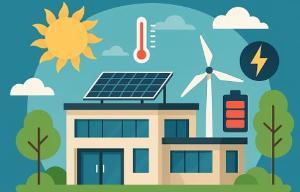


Buildings are on the frontlines of climate impacts — from extreme heat and hurricanes to power disruptions and rising energy costs. In a region characterized by rapid urban development and climate vulnerability, energy-efficient, resilient buildings are essential for community safety, affordability, and long-term sustainability.
Our Focus Areas
Partnering with local communities, governments, industry stakeholders, and organizations, the Building Energy team is co-developing strategies that are grounded in science and tailored to the Space Coast context. The goal is to enable homes, schools, and other buildings to not only reduce emissions but also withstand and adapt to the growing challenges of climate change and urbanization.
Florida Tech team has successfully completed multiple building energy-related projects in the recent years. Selected Success Stories are as follows:
In an initiative led by Drs. Troy Nguyen, Hamid Najafi, and Aldo Fabregas, the Florida Tech team designed and constructed the new Alumni Center—a cost-effective, scalable zero-energy building tailored for Florida's climate. This project was funded through a REET grant from the Florida Department of Agriculture and Consumer Services, with matching contributions from multiple industry partners and Florida Tech, totaling approximately $800,000.
The facility serves as a living laboratory and research platform, equipped with:
Florida Tech’s Folliard Alumni Center was recognized by the City of Melbourne Beautification and Energy Efficiency Board (BEEB) with its Clean Energy Award at the March 22, 2022 City Council meeting. See the full Story at:
Florida Tech team has published multiple articles related to this project. Selected articles are cited below:
In partnership with Brevard Public Schools (BPS), the Florida Tech ASHRAE Student Branch conducted energy audits at selected schools near the university campus. These site visits took place in Spring 2019, and findings were presented at the ASHRAE Winter Conference in Orlando, FL (2020).
The initiative provided hands-on learning for students while identifying meaningful energy-saving opportunities for K–12 facilities. Key outcomes and insights were published in two peer-reviewed articles:
Upcoming Relevant Presentations:
Previous Relevant Presentations:




© Florida Institute of Technology, All Rights Reserved